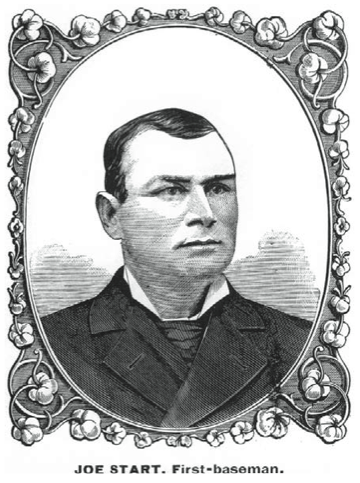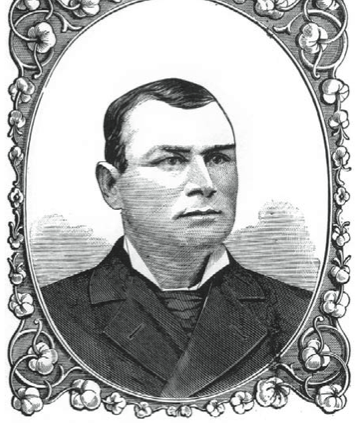August 29, 1870: Atlantics beat Forest City in ‘The Most Remarkable Base Ball Game on Record’
 The mood at the Fair Grounds in Rockford, Illinois, on August 29, 1870, may have felt like a World Series game to the twenty-first-century fan. Forest City’s faithful knew they were about to watch the most important game in Rockford’s history. “Everything was at stake for both clubs,” reported the Rockford Register, “the one [Rockford] to obtain [and] the other [Brooklyn] to retain the much coveted Champion Flag.”1
The mood at the Fair Grounds in Rockford, Illinois, on August 29, 1870, may have felt like a World Series game to the twenty-first-century fan. Forest City’s faithful knew they were about to watch the most important game in Rockford’s history. “Everything was at stake for both clubs,” reported the Rockford Register, “the one [Rockford] to obtain [and] the other [Brooklyn] to retain the much coveted Champion Flag.”1
The Forest Citys had defeated the Atlantics, 17-16, on May 31 in Brooklyn.2 By the rules of the day, a challenger would win the pennant if it defeated the champion twice in three games.3 The Atlantics, who had reigned as champions since defeating Eckford on November 8, 1869,4 had avoided giving the Cincinnati Red Stockings an opportunity to claim the pennant throughout Cincinnati’s 81-game winning streak, diminishing Brooklyn’s legitimacy as the champion. That had changed on June 14, when the Atlantics defeated Cincinnati 8-7 in 11 innings.
Back on May 31, Rockford had rallied for five runs in the top of the ninth, taking the lead, 17-14. The Atlantics answered with two runs of their own and had runners on first and third with one out. Joe Start, in his eighth season as the Atlantics’ first baseman,5 made contact with a pitch from Al Spalding. Umpire William McMahon initially called it a foul ball, but Start’s hit carried far enough to reach shortstop Ross Barnes.
Both Atlantics baserunners, having not heard McMahon’s call, ran upon seeing the ball bound to Barnes. In 1870 the rule was that a foul ball was live again the moment it was returned to the pitcher, regardless of where the runners were.6 Barnes quickly returned the ball to Spalding, who tossed to third base for the first out. Then the ball was returned to Spalding, who tossed it again to first, doubling off the befuddled runners standing at second and home who had unwittingly tried to advance on a dead ball.7 Per the Chicago Tribune, “The spectators, to whom the passing of the ball round the field … seemed a perfect mystery, were perfectly astonished when they heard that the game was over, and the Atlantics had lost.”8
The controversy, coupled with the championship being on the line, made the Rockford crowd rowdy from the jump on August 29. The 19-year-old Spalding took the pitcher’s box for Rockford. His confounding mechanics were still upsetting the game’s best hitters four years into his career. Spalding would freeze at the top of his windup, sometimes for up to 20 seconds.9 His deceptive timing proved effective against Brooklyn. George “Charmer” Zettlein hurled for the Atlantics. In contrast to Spalding, Zettlein relied on what the New York Clipper called the velocity “of a ball shot from a cannon.”10
The umpire was James Haynie, “one of the most honest and prompt umpires that ever umpired a game.”11 An umpire of renown would be especially important to the day’s game, given the controversy surrounding the game-ending play on May 31.
The Forest Citys started nervously and gave up six unearned runs in the first four innings. The seventh began with the Green Stockings trailing 11-8.12
After Rockford scored a run, Forest Citys slugger Gat Stires came to bat with one out. Twenty years old but only one season away from retirement,13 Stires hit a single to keep the rally going. A passed ball by Atlantics catcher Bob Ferguson allowed Stires to move from first to third. Ferguson struggled behind the plate all day, owing to a broken finger.14
Joe Doyle stepped up next and stroked a sinking line drive to left field. Brooklyn’s George Hall, in his first season with the club, made a spectacular catch “six inches from the ground.”15 Stires managed to score on a passed ball while the next batter was up, and the seventh inning ended 11-10.
The Atlantics added two runs in the top of the eighth. The Forest Citys had scored two runs of their own in the bottom half when team captain Scott Hastings batted with nobody on and two outs. Hastings hit a groundball single, then made it to second on an error and stole third. Stires came up clutch again with a single to short right field, tying the game, 13-13.
Stires’s base hit sent the Rockford cranks into hysterics. “Enthusiasm was so great that play was stopped for a few moments, in order that the men might enjoy the bliss in shouting themselves hoarse, and the ladies shake their cambric kerchiefs and kiss each other in a manner tantalizing to the umpire and other strangers,” reported the New York Clipper.16 Once play resumed, Doyle hit into a force out to end the inning.
Lip Pike quieted the crowd with a leadoff double to start the ninth. After Jack McDonald flied out, Dickey Pearce hit a line-shot single into center field. But Pike pushed his luck by trying to score from third and was caught in a rundown by Spalding and Tom Foley.17 Rockford had preserved the deadlock.
The home half of the ninth went quickly. There was a bit of drama when Doyle hit a lazy pop foul along third base. Charlie Smith would have made an easy play, except that the Fair Grounds sported fully grown trees on the foul side of the bag. The branches swallowed the ball, giving Doyle a second chance.18 Unperturbed, Zettlein instead finished Doyle on strikes.
Dual whitewashes in the 10th brought the proceedings to an 11th inning. This was when James Haynie suffered his one controversy. The New York Clipper explained that Hastings dropped George Hall’s third strike “which struck (Haynie) and rolled about ten feet away.” Hall assumed that the ball was dead and moved toward first with little urgency. “But Hastings picked up the ball, sent it accurately to Doyle before Hall could reach the coveted bag, and the umpire decided the runner out. He claims that as umpire he should not be considered an outsider; hence, it is not a dead ball.”19 Remarkably, Brooklyn did not protest the call.20
Rockford came to bat in the 11th with another chance to walk off the champions. The first two batters were retired before Foley stroked a base hit to left “amid tremendous applause.”21 Stires came up clutch again with another single, putting Foley at second. With the winning run in scoring position, Doyle hit a comebacker to Zettlein. As Zettlein tossed to first, it was clear that he had soared the throw two feet above Joe Start’s head. For a moment, it appeared that Rockford was going to plate the winning run.
But Start leapt into the air and, miraculously, came down with the errant throw before landing on the bag for the out. “Let it be recorded,” the Tribune paused its game story to note, “that Joe Start’s first base play won this game for the Atlantics.”22
Spalding, who had been steady all day from the pitcher’s box, started the 12th inning with some help from his center fielder, Joe Simmons. McDonald crushed a pitch “nearly out of sight, but Simmons took it in splendid style.”23 After that excitement, Spalding grew briefly erratic; Pearce managed to work a walk “on three called balls.”24 Charlie Smith’s single moved Pearce into position for the hero from the 11th, Joe Start. The great Atlantic first baseman met the moment once again, driving home Pearce with a single to right.
“Death to Flying Things” Jack Chapman came up next and barreled a deep fly ball to left, where Rockford’s Fred Cone gave chase. As the Chicago Tribune reported, “The hit was good for two more runs, everybody thought, but Cone leaped into the air and caught the ball with his left hand, and received the grateful plaudits of the crowd for his beautiful and extraordinary catch.”25 It was a play worthy of Chapman’s famous nomenclature.
Both Cone’s one-hand catch and Hall’s eighth-inning shoestring grab were described by the Clipper as “fly catches that had never been excelled on a ball field.”26
Cone’s catch kept Rockford within one, but the home magic was depleted. The Atlantics calmly dispatched the Rockford bats for their fourth consecutive shutout inning, winning the contest 14-13. The headline in the next day’s Chicago Tribune proclaimed it “The Most Remarkable Base Ball Game on Record.”27
The Rockford club tried to set up a decisive third meeting before the Atlantics left town, but there was not a ball field available on such short notice. “It is expected,” the Register stated, “these noted nines will measure willows again at an early day.”28 Sadly, that decisive third game never came to pass. While Rockford joined the National Association in 1871, the Atlantics abstained and reclaimed amateur status.29 The Forest Citys of Rockford folded at the end of 1871 due largely to poor attendance.30
Acknowledgments
This article was fact-checked by Jim Sweetman and copy-edited by Len Levin.
Photo credit: Joe Start, SABR-Rucker Archive.
Sources
In addition to the sources cited in the Notes, the author consulted Baseball-Reference.com and Retrosheet.org for pertinent information.
Notes
1 “The National Game,” Rockford Register, September 3, 1870: 8.
2 “Sporting Matters,” Chicago Tribune, June 2, 1870: 5.
3 Brooklyn Daily Times, March 10, 1868: 2.
4 “The Championship,” New York Clipper, November 13, 1869: 3.
5 Marshall D. Wright, The National Association of Professional Base Ball Players, 1857-1870 (Jefferson, North Carolina: McFarland Press, 2000), 58, 70, 77, 85, 98, 115, 149, 191, 246, 298.
6 William J. Ryczek, When Johnny Came Sliding Home: The Post-Civil War Baseball Boom, 1865-1870 (Jefferson, North Carolina: McFarland Press, 1998), 38-39.
7 Ryczek, 38-39.
8 “Sporting Matters.”
9 “Sporting News,” Brooklyn Daily Times, May 31, 1870: 3.
10 “Atlantic vs. Forest City,” New York Clipper, September 10, 1870: 4.
11 “The National Game.”
12 “The Most Remarkable Base Ball Game On Record,” Chicago Tribune, August 30, 1870: 4.
13 Peter Morris, “Gat Stires,” SABR BioProject. Accessed January 6, 2025, https://sabr.org/bioproj/person/gat-stires.
14 “Atlantic vs. Forest City.”
15 “The Most Remarkable Base Ball Game on Record.”
16 “Atlantic vs. Forest City.”
17 “The Most Remarkable Base Ball Game on Record.”
18 “The Most Remarkable Base Ball Game on Record.”
19 “Atlantic vs. Forest City.”
20 Perhaps the passive indignation can be credited to Haynie’s reputation. After all, there was no reason to doubt Haynie’s integrity in 1870. The game occurred a year before the Great Chicago Fire, and another 20 years still before Haynie would be implicated by a co-conspirator as having helped create the myth of Mrs. O’Leary’s cow. Ben Railton, “Considering History: Mrs. O’Leary’s Cow Didn’t Start the Great Chicago Fire. Why Does It Matter?” Saturday Evening Post, October 8, 2021, http://www.saturdayeveningpost.com/2021/10/considering-history-mrs-olearys-cow-didnt-start-the-great-chicago-fire-why-does-it-matter.
21 “The Most Remarkable Base Ball Game on Record.”
22 “The Most Remarkable Base Ball Game on Record.”
23 “The National Game.”
24 “The National Game.”
25 “The Most Remarkable Base Ball Game on Record.”
26 “Atlantic vs. Forest City.” The New York Clipper recap misidentifies the Cone catch as happening in the ninth inning. Both the Tribune and the Register report that the Cone play happened in the 12th inning.
27 “The Most Remarkable Base Ball Game on Record.”
28 “The National Game.”
29 Wright, The National Association of Professional Base Ball Players, 328.
30 Mark Rucker and John Freyer, 19th Century Baseball in Chicago (Charleston, South Carolina: Arcadia Publishing, 2003), 42.
Additional Stats
Atlantics of Brooklyn 14
Forest City Club of Rockford 13
Fair Grounds
Rockford, IL
Corrections? Additions?
If you can help us improve this game story, contact us.


